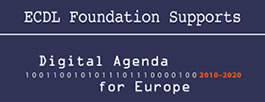Top 10 ICT skills for employees
We now spend an incredible 28% of our working weeks reading, writing or responding to email, according to McKinsey Global Institute. It’s obvious that, whether you work in an office or not, knowing what to do with a computer is vital in the modern workplace.
Falling behind with digital skills means falling behind on income-level, employability, and even health and well-being. So what can you do to make sure you have what it takes to make it in today’s work environment? Here are our top 10 ICT skills for employees.
1. Spreadsheets
In a recent study, participants had an average performance of only 38% for using spreadsheets. Despite this, 89% of employers in a survey by the British Computing Society rated spreadsheet skills as being important. Perhaps the numbers and complicated looking formulas give flashbacks to maths class in school, but there’s little to really be afraid of. From planning an event or gathering press clippings, to sorting out crop rotation on a farm or doing the accounts, spreadsheets have many uses, and can make complicated calculations as easy as a point and a click.
Find out about the ECDL / ICDL Spreadsheets module
2. Social media
 Facebook and Twitter might not always be right at home in the office, but social networking sites can be great to show off your professional abilities to prospective employers. Work-based social platforms, such as Yammer or Salesforce, open up new ways for working with colleagues, whether they are sitting across from you or sitting across the other side of the world. Learn how to stay safe and avoid some of the dangers lurking in darker corners of the social web, and you could be surprised by the doors that open with social media.
Facebook and Twitter might not always be right at home in the office, but social networking sites can be great to show off your professional abilities to prospective employers. Work-based social platforms, such as Yammer or Salesforce, open up new ways for working with colleagues, whether they are sitting across from you or sitting across the other side of the world. Learn how to stay safe and avoid some of the dangers lurking in darker corners of the social web, and you could be surprised by the doors that open with social media.
Read about the ECDL / ICDL Online Collaboration module
3. Presentations
We’ve all sat through the 2-hour presentation where every word the speaker uttered was written up on the slides. Don’t be that person. A little understanding of how to make the most of tools like PowerPoint or Keynote, and you could give a presentation worthy of Steve Jobs. What’s more, a solid understanding of presentation software could save your company more than a bored audience. In a study in Greece, the time an employee spent dealing with difficulties using presentation software was estimated to cost companies almost €500 a year!
Learn more about the ECDL / ICDL Presentation module
4. Email
Even if it is one of the older tools that we use on the Internet, email is still the pulse of communication for companies. Knowing when to use, or when not to use, ‘reply-all’ could mean the difference between having a job or not! On a happier note, being able to use email effectively, shows off other vital workplace skills, like communication and the ability to work with others.
Read about the ECDL / ICDL Online Essentials module
5. Staying safe
As well as lots of opportunities, there are plenty of ways that using a computer can go wrong. From losing or leaking sensitive data, to becoming a victim of cybercrime, staying safe on a computer is just as vital as staying safe on the street. According to Europol, cybercrime could cost victims around €290 billion a year worldwide.
Find out about the ECDL / ICDL IT Security module
6. Research
 The days of research requiring a trip to the library are over. Employees in a range of industries are expected to be able to carry out their own research, using online resources and tools. Market research for a new product, looking at how regulations apply in a particular field, and staying up-to-date on the latest developments in your company’s area of work all demand strong research skills using computers. Thankfully the rewards of being able to find and assess information online are great; it’s no surprise that employers want employees with these skills!
The days of research requiring a trip to the library are over. Employees in a range of industries are expected to be able to carry out their own research, using online resources and tools. Market research for a new product, looking at how regulations apply in a particular field, and staying up-to-date on the latest developments in your company’s area of work all demand strong research skills using computers. Thankfully the rewards of being able to find and assess information online are great; it’s no surprise that employers want employees with these skills!
7. Troubleshooting
How many times have you had to call IT for the simplest of problems that, with a little knowledge, you could have easily fixed yourself? While most IT managers would probably not approve of you rewiring the server room to fix your printer problem, they might welcome a respite from having to ask the old question, “is it plugged in?”
8. Word processing
If you work in an office, chances are that you will spend a large amount of your time working in a word processor. Whether you are drafting letters, or preparing a report for your boss, you need to be able to use your word processor with flair. Word processors have come a long way from the days of digital typewriters, and even the older software around today offers sophisticated paragraph styles and formatting options. Yet in a recent study, young people achieved a performance of only 20% in changing the style of a paragraph. Make sure your next report stands out from the crowd.
Read more on the ECDL / ICDL Word Processing module
9. Working with data
You don’t need deep pockets to benefit from ‘big data’. Some spreadsheet skills and an ability to present your findings in charts and reports could help you recognise trends in sales data, patterns in local weather data, or even the best time to buy an essential supply. From offices, to farms and event planning, being able to read data is one of those skills that will set you up for the future.
Learn about the ECDL / ICDL Advanced Spreadsheets module
10. Confidence
Above all, having the confidence to use your ICT skills is key to getting the most out of your experience and what you know. What better way to show off your confidence in your new-found abilities, than with ECDL / ICDL certification!
Discover the full range of ECDL / ICDL modules available
Photos by Death to the Stock Photo

